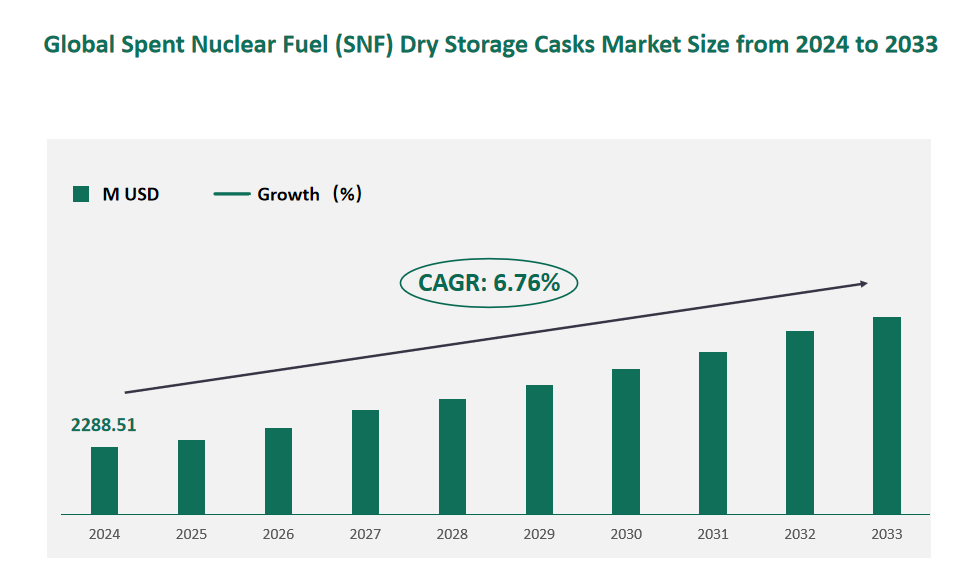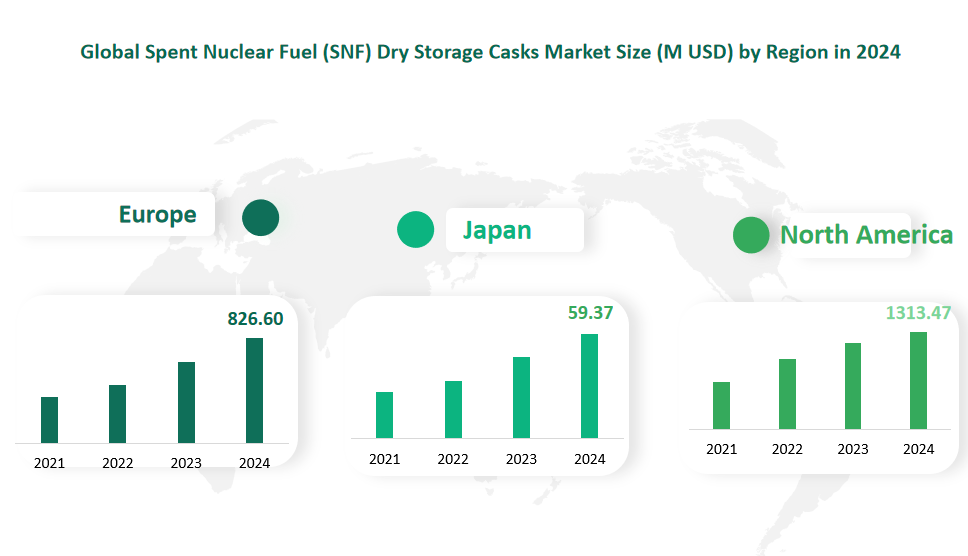1 Global Spent Nuclear Fuel (SNF) Dry Storage Casks Market Size (Value) and CAGR (2024-2033)
In 2024, the global Spent Nuclear Fuel (SNF) Dry Storage Casks market was valued at USD 2288.51 million, with a CAGR of 6.76% from 2024 to 2033.
Spent nuclear fuel refers to nuclear fuel that has been irradiated and used, usually produced by the nuclear reactors of nuclear power plants. Spent Nuclear Fuel (SNF) Dry Storage Casks is a container for storing spent nuclear fuel. It can be divided into concrete and steel according to the different radiation barrier materials.
Figure Global Spent Nuclear Fuel (SNF) Dry Storage Casks Market Size (M USD) and CAGR 2024-2033

2 Spent Nuclear Fuel (SNF) Dry Storage Casks Market Drivers
The market for Spent Nuclear Fuel (SNF) Dry Storage Casks is driven by several key factors that are contributing to its steady growth. The primary driver is the increasing volume of spent nuclear fuel generated by nuclear power plants worldwide. As nuclear energy continues to be a significant source of power, the need for safe and efficient storage solutions for spent fuel has become critical. This has led to a growing demand for SNF Dry Storage Casks, which are designed to provide secure containment and management of spent nuclear fuel.
Another significant driver is the technological advancements in dry storage technology. Modern SNF Dry Storage Casks are engineered to offer superior radiation shielding, thermal management, and structural integrity. These advancements have made dry storage a more viable and preferred option compared to traditional wet storage methods. The flexibility of dry storage casks, which can be used for both storage and transportation, further enhances their appeal to nuclear power plant operators.
3 Spent Nuclear Fuel (SNF) Dry Storage Casks Market Restraints
Despite the growing demand and technological advancements, the SNF Dry Storage Casks market faces several challenges and restraints that could hinder its growth. One of the primary challenges is the high technical barriers associated with the manufacturing of these casks. SNF Dry Storage Casks are highly specialized products that require advanced materials, precise engineering, and rigorous testing to ensure their safety and effectiveness. The manufacturing process involves stringent quality control measures and compliance with international safety standards, which can be complex and costly.
Another significant challenge is the strict industry regulation. The storage of spent nuclear fuel is subject to stringent safety and environmental regulations due to the potential risks associated with radioactive materials. Companies operating in this market must adhere to comprehensive regulatory frameworks that cover all aspects of the cask’s lifecycle, from design and manufacture to operation and decommissioning. Compliance with these regulations can be time-consuming and expensive, posing a barrier to entry for new players.
4 Global Spent Nuclear Fuel (SNF) Dry Storage Casks Market Size by Type in 2024
Concrete casks are widely used due to their cost-effectiveness and ease of manufacturing. They are constructed from reinforced concrete, which provides excellent radiation shielding properties. In 2024, the market value for concrete casks is projected to be $907.25 million USD. This type of cask is particularly favored for its ability to provide robust shielding against gamma and neutron radiation. Additionally, concrete casks are known for their durability and resistance to environmental factors, making them suitable for long-term storage solutions.
Concrete casks are typically used in horizontal storage configurations, where the spent fuel assemblies are stored in a dry environment with passive cooling. This design ensures that the casks can maintain safe temperature levels without the need for active cooling systems. The NUHOMS system, for example, is a well-known concrete cask system that provides a reliable and cost-effective solution for the storage of spent nuclear fuel.
Steel casks, on the other hand, are known for their superior thermal conductivity and structural strength. They are made from thick-walled steel and often lined with stainless steel to enhance their durability and resistance to corrosion. In 2024, the market value for steel casks is expected to reach $1381.26 million USD. Steel casks are particularly advantageous for their ability to dissipate heat efficiently, which is crucial for managing the decay heat generated by spent nuclear fuel.
Steel casks are often designed for both storage and transportation, making them versatile solutions for nuclear power plants. They can be used in vertical storage configurations and are equipped with advanced safety features, such as neutron-absorbing materials and redundant shielding layers.
Table Global Spent Nuclear Fuel (SNF) Dry Storage Casks Market Size by Type in 2024
Type | Market Size (M USD) 2024 | Market Share 2024 |
Concrete | 907.25 | 39.64% |
Steel | 1381.26 | 60.36% |
5 Global Spent Nuclear Fuel (SNF) Dry Storage Casks Market Size and Share by Application in 2024
Large nuclear power plants, typically with a single unit capacity exceeding 300,000 kilowatts, are significant consumers of SNF Dry Storage Casks. In 2024, the market value for SNF Dry Storage Casks used in large nuclear power plants is projected to reach $1,809.71 million. These plants generate a substantial amount of spent nuclear fuel, necessitating robust and reliable storage solutions. Large nuclear power plants often require high-capacity storage casks that can accommodate multiple fuel assemblies while ensuring safety and compliance with regulatory standards.
Small nuclear power plants, which have a single unit capacity of less than 300,000 kilowatts and are often modular in design, also contribute to the demand for SNF Dry Storage Casks. In 2024, the market value for SNF Dry Storage Casks used in small nuclear power plants is expected to be $334.70 million. These plants benefit from the flexibility and scalability of dry storage solutions, which can be tailored to their specific needs. Small nuclear power plants often use modular storage systems that can be easily expanded as the plant’s capacity grows.
Table Global Spent Nuclear Fuel (SNF) Dry Storage Casks Market Size and Share by Application in 2024
Application | Market Size (M USD) 2024 | Market Share 2024 |
Small Nuclear Power Plant | 355.78 | 15.55% |
Large Nuclear Power Plant | 1933.07 | 84.46% |
6 Global Spent Nuclear Fuel (SNF) Dry Storage Casks Market Size by Region in 2024
North America is the largest market for SNF Dry Storage Casks, driven by the extensive nuclear infrastructure in the United States and Canada. In 2024, the market value for SNF Dry Storage Casks in North America is projected to be $1313.47 million. The region’s focus on nuclear energy and stringent safety regulations have led to a high demand for advanced and reliable storage solutions. Companies like Orano TN and Holtec International are major players in this region, offering a range of products tailored to the specific needs of North American nuclear power plants.
Europe is another significant market, with a strong commitment to nuclear energy and the need for advanced storage solutions. In 2024, the market value for SNF Dry Storage Casks in Europe is expected to reach $826.60 million. European countries, particularly those with large nuclear fleets like France and the UK, are driving the demand for high-capacity and multi-purpose casks. Companies such as GNS Gesellschaft für play a crucial role in providing these solutions, leveraging their expertise in nuclear waste management.
Japan, despite its relatively smaller market size, is a key player in the SNF Dry Storage Casks market. In 2024, the market value for SNF Dry Storage Casks in Japan is projected to be $59.37 million. Japan’s focus on nuclear energy and the need for safe storage solutions following the Fukushima disaster have led to increased demand for advanced dry storage casks.
Figure Global Spent Nuclear Fuel (SNF) Dry Storage Casks Market Size by Region in 2024

7 Major Players in Global Spent Nuclear Fuel (SNF) Dry Storage Casks Market
7.1 Orano TN
Company Profile:
Orano TN is a leading provider of integrated nuclear logistics solutions, specializing in the design, approval, and manufacture of packaging for nuclear transport and storage. Established in 2001 and headquartered in the USA, Orano TN operates primarily in North America, Europe, and Asia. The company is renowned for its expertise in the dry storage of spent nuclear fuel, offering comprehensive nuclear waste logistics services.
Business Overview:
Orano TN has a strong reputation for providing high-capacity, high-burnup, and high-heat load systems for Pressurized Water Reactors (PWR) and Boiling Water Reactors (BWR) dry used fuel storage needs. Their NUHOMS EOS Canister system is a prime example of their innovative approach, offering cost-efficient fabrication and robust shielding capabilities. In recent years, Orano TN has continued to expand its product offerings and market reach, solidifying its position as a key player in the industry.
Products Offered:
Orano TN offers a range of products, including the NUHOMS EOS 37PTH and 89BTH Dry Shielded Canisters (DSC). These canisters are designed to store and transport spent nuclear fuel assemblies with high efficiency and safety. The EOS 37PTH DS0C can store 37 PWR fuel assemblies, while the 89BTH is designed for 89 BWR fuel assemblies. These products are optimized for plants with minimum crane capacities and are fully shielded for safe transportation and storage.
Recent Financial Data:
In the most recent year, Orano TN reported a revenue of $294.44 million.
7.2 Hitachi Zosen Corporation
Company Profile:
Hitachi Zosen Corporation is a major Japanese industrial and engineering company with a long history dating back to 1881. Headquartered in Osaka, Japan, the company specializes in the production of waste treatment plants, industrial machinery, and power plants. Hitachi Zosen Corporation is also a leading provider of spent nuclear fuel storage solutions, with a focus on innovation and safety.
Business Overview:
Hitachi Zosen Corporation’s subsidiary, NAC International Inc., is a key player in the design, transportation, and consultation of containers for spent fuel and High-Level Nuclear Waste (HLW). The company’s recent acquisition of shares in Deep Isolation, Inc. highlights its commitment to exploring innovative solutions for the disposal of spent fuel and HLW. This strategic move positions Hitachi Zosen Corporation at the forefront of technological advancements in nuclear waste management.
Products Offered:
Hitachi Zosen Corporation offers a range of products, including metal casks and concrete buckets for the storage and transportation of spent nuclear fuel. Their MAGNASTOR® system is a next-generation Multipurpose Canister System capable of storing 37 PWR or 87 BWR spent fuel assemblies. This system is designed to provide improved capacity, thermal performance, and operational efficiency, making it a preferred choice for nuclear facilities.
Recent Financial Data:
In the most recent year, Hitachi Zosen Corporation reported a revenue of $128.78 million.
7.3 GNS Gesellschaft für
Company Profile:
GNS Gesellschaft für is a leading provider of solutions for nuclear waste management, with a focus on the processing of high-level waste and spent fuel elements. Established in 1974 and headquartered in Essen, Germany, GNS Gesellschaft für operates primarily in Europe and Japan. The company is known for its expertise in the safe handling, packaging, and storage of radioactive waste and residues.
Business Overview:
GNS Gesellschaft für offers comprehensive solutions for all phases of decommissioning and dismantling nuclear power plants. Their recent acquisition of the nickel plating business from MTV NT GmbH highlights their commitment to expanding their capabilities and enhancing their product offerings. This strategic move allows GNS Gesellschaft für to provide even more robust solutions for nuclear waste management.
Products Offered:
GNS Gesellschaft für offers a range of products, including the CONSTOR® and CASTOR® casks. The CONSTOR® cask is designed for the transport and interim storage of spent fuel elements, featuring a multi-layer design for maximum safety and reliability. The CASTOR® V/19 vessel is designed for the transport and storage of spent fuel assemblies from PWRs, offering a single-piece construction with enhanced safety features. These products are designed to meet the stringent safety standards required for nuclear waste management.
Recent Financial Data:
In the most recent year, GNS Gesellschaft für reported a revenue of $89.39 million.

